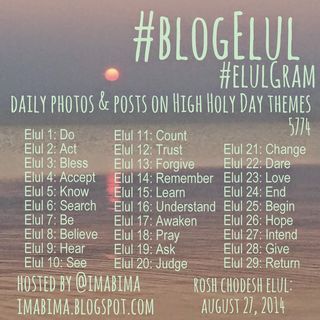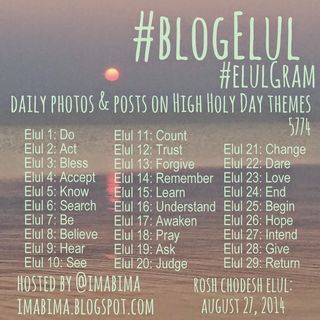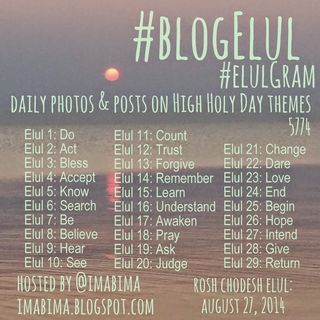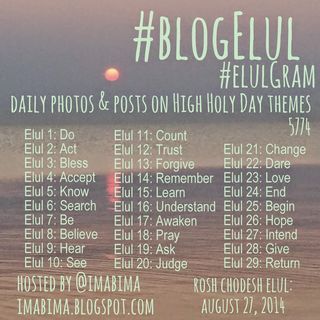Rachel Barenblat's Blog, page 147
September 19, 2014
Praise for Days of Awe
I've received some lovely feedback on Days of Awe: the Velveteen Rabbi's Machzor for the Yamim Nora'im. One of the most generous responses has come from reviewer Susan Katz Miller, who writes:
Meanwhile, many of the most progressive Jewish communities have been working to create services that will honor tradition, while also breathing new life into Rosh Hashanah and Yom Kippur (as well as all the rest of the days in the Jewish calendar). One of those visionaries is Rabbi Rachel Barenblat, an accomplished poet and Jewish Renewal rabbi often known by her blogging moniker, The Velveteen Rabbi. This year, Rabbi Rachel has published (with Rabbi Jeff Goldwasser) a gorgeous new Machzor (the prayerbook specifically for the High Holidays). Days of Awe inspires with new translations, lively illustrations, and poetry that avoids platitudes. Along with her own marvelous poems, she includes poems from Yehuda Amichai, Leonard Cohen, Marie Howe, David Lehman, Alicia Ostriker, Omar Khayyam, Phillip Schultz, Hannah Szenes, Herman Taube, and Rumi. The translations and interpretations come from rabbis including Shlomo Carlebach, Jill Hammer, Burt Jacobson, Marcia Prager, Rami Shapiro, David Shneyer, Hannah Tiferet Siegel, and the much-beloved Zalman Schachter-Shalomi, founder of Jewish Renewal.
In addition to infusing the services with carefully curated poetry and translations, this prayerbook invites and welcomes all (interfaith, disaffected, seeking) by explaining the sense and structure of the services. For instance, the repetition of the Kaddish through the services can seem bewildering and stultifying. Rabbi Rachel stops to explain that the Kaddish acts as a door to mark the transition to each new section of the service, and her Machzor illustrates this concept with a series of lovely photographs of different doors inserted with each recurrence of the Kaddish...
I expect Days of Awe will...exert an influence throughout the increasingly diverse and complex Jewish world.
You can read Susan's review at her blog: High Holy Days: Now With Great Poetry! (Susan is author of Being Both, which I wrote about last year.)
Meanwhile, in addition to kvelling at kind responses like Susan's, I'm also collecting edits for an eventual second edition of the machzor. This is the first year that this machzor will be used anywhere (to the best of my knowledge, it's being piloted in three congregations across the United States, as well as possibly in a small havurah in Thailand), and I am looking forward to collecting feedback so that I can improve it for a second edition. Stay tuned for more on that as the new year unfolds.
Through the equinox door
 We're approaching the doorway between the old year and the new.
We're approaching the doorway between the old year and the new.
Just as Jewish tradition teaches us to put a mezuzah on our doorposts, to make us mindful as we transition from one place to the next, the holidays act as mezuzot on the doorposts of our year. We're moving from one place to the next. What memories do we want to bring with us? What baggage do we want to leave behind, outside the door?
This weekend we're approaching another doorway, too: the equinox, the hinge between summer and fall. Every door offers a chance to pause and look back. In the season now ending, where did I live up to my hopes for who I would be, and where did I fall short? What do I want to lift up and remember, and what to I want to let go of, to release?
What do I want to bring with me into the new year, and into the coming season of preparing to lie fallow for the winter? What do I need to focus on so that the qualities I want to cultivate will naturally arise in me?
I posted recently about Why I love Selichot services. (Those who receive this blog via email may have received an incomplete version of the post by accident -- please do click on the link and read the whole thing if you are so inclined!) But one thing I didn't mention in that post is that this year, Selichot comes on the eve of September 21, which is for me the first day of autumn.
For what do I need to say "I'm sorry" in order to enter the new season, the new year, with a clean slate? Where do I need to create repair in my relationships with other people, with my own soul, with the Earth, with my Source? What old resentments or frustrations do I need to shed in order to walk through this doorway with my spine straight and my shoulders unclenched?
Fall is coming. The new year is coming. Who do I want to become on the other side of this door?
This is a variation on the teaching I offered during this morning's meditation minyan at my shul.
Related: First day of fall, 2012.
A poem for #BlogElul 24: End
END (ELUL 24)
And every ending is a beginning.
Rolling back light before darkness
and darkness before light. Making
one year pass away and bringing on
the next. And when my life ends
you'll go on to a chapter without me
and I'll go on to -- I'll know
when I get there, but I'm not sure
you'll be able to read the postcards
I send from that other side.
The cardinal alighting at the top
of the pine, the rough weave
of a rainbow tallit beneath your thumb
-- will you remember the language
of flowers, the meanings hidden
in the shofar's calls? Or will you
imagine that the world truly ends
at the thundering waterfall?
One door closes and another opens.
Start the story over again
with the spirit of God hovering
over the deep waters of the womb.
"Rolling back light before darkness and darkness before light" is a reference to the ma'ariv aravim ("Who Evens the Evenings") prayer which we recite every night: "Blessed are You, Adonai our God, Source of all being, who rolls back light before darkness and darkness before light, who makes day pass away and brings on the night..."
I'm participating again this year in #blogElul, an internet-wide carnival of themed posts aimed at waking the heart and soul before the Days of Awe. (Organized by Ima Bima.) You can read last year's and this year's #blogElul posts via the Elul tag; last year's posts are also available, lightly revised, in the print chapbook Elul Reflections.
September 18, 2014
A poem for #blogElul 23: Love
 LOVE (ELUL 23)
LOVE (ELUL 23)
Four tiny books in a printed cardboard box.
A handprint, undated—maybe he was two?
An autograph-keeper with faded pages
inscribed in spidery curlicues of Czech.
The onesie and pants and booties we chose
for the cautious drive home from the hospital.
Silver posy of dried wedding lilies
tucked into the cup I carried by hand
from Karlovy Vary. I save these talismans
behind sliding glass as though they were portals
to voices I'll never hear again, hands
small and hot or soft and wrinkled in mine.
How does God bear the accumulation of memory?
Lives superimposed in time-lapse photographs.
Our bridges, skyscrapers, symphonies, sculptures
like the fingerpainted art my son brings home.
And when we're gone does God leaf slowly
through the still frames of our remembered lives
amazed that no matter how many souls we are
there's always room for more love?
I'm participating again this year in #blogElul, an internet-wide carnival of themed posts aimed at waking the heart and soul before the Days of Awe. (Organized by Ima Bima.) You can read last year's and this year's #blogElul posts via the Elul tag; last year's posts are also available, lightly revised, in the print chapbook Elul Reflections.
September 17, 2014
A poem for #blogElul 22: Dare
 DARE (ELUL 22)
DARE (ELUL 22)
To cross the threshold
between familiar and unknown.
To stop hiding. To dance
even if you feel
like an ungainly giraffe.
To let the tears come.
To throw your arms out
and pour light on the world.
To start over, relearning
everything. To notice
what you habitually rely on.
To push on the door
you know shouldn't be open
and laugh when it swings free.
To make a different choice
the second time around.
To admit that you're scared.
To find places you've never been.
To name something after
those you've lost.
To change the desktop, redo
the walls. To line the insides
of your pockets with silk.
To say goodbye this time.
I'm participating again this year in #blogElul, an internet-wide carnival of themed posts aimed at waking the heart and soul before the Days of Awe. (Organized by Ima Bima.) You can read last year's and this year's #blogElul posts via the Elul tag; last year's posts are also available, lightly revised, in the print chapbook Elul Reflections.
September 16, 2014
Why I love Selichot
I love Selichot. The word "selichot" means "pardons," and can refer to the series of teshuvah-related (repentance / return - related) prayers which we recite during the Days of Awe. It can also refer -- as it does in this instance -- to the service which begins the High Holiday season, on the Saturday evening before Rosh Hashanah, during which we begin singing some of those prayers once again for the first time in a long while.
I love it because it's intimate. Of course I love throwing back the walls of our sanctuary and filling the whole building with chairs for Rosh Hashanah and Yom Kippur. It is a joy to see so many faces during the Days of Awe! But there is something extra-special for me about the intimacy of our Selichot services, which are usually attended by 20 or 25 people. I love being able to look around the room and see the faces of people who are dear to me.
I love it because it begins with havdalah. I don't make havdalah often enough. Every time I do it, I remember how much I love it, and I think: why don't I do this every week? (I should do it every week, I know! It is the closing ritual which bookends lighting Shabbat candles; I do that every week, so why don't I always do the short ritual at the other end of Shabbat?) I love the scent of spicy cloves, the light of the braided candle held aloft, the melody of the blessings.
I love it because it launches us into the High Holiday season. We are not a community where a daily minyan is reciting tachanun (the service of penitential prayers) on a regular basis, so for most of us, prayers like "Avinu Malkeinu" ("Our Father, Our King") and the vidui are only experienced during the Days of Awe. Selichot comes a few days before the holidays begin, and singing these beloved melodies and ancient words helps to emotionally get us going.
I love it because my little shul has adopted a practice I learned at the old Elat Chayyim years ago. At Selichot, while I play quiet guitar music, people write down (anonymously) on index cards things for which they seek forgiveness -- misdeeds and mis-steps -- places where they missed the mark in the last year -- baggage from which they seek release. These are collected and I weave them into one of the "Al Chet" prayers of Yom Kippur.
I love it because it bookends the intensity of the Days of Awe: havdalah, then Selichot, then Rosh Hashanah, then Shabbat Shuvah, then Yom Kippur, which ends with havdalah again. (This is true even when Yom Kippur falls on a weekday; when it falls on Shabbat, as it does this year, the havdalah at its close is extra-special.) We begin with havdalah and we end with havdalah, but in between we've taken a spiritual journey which changes our experience of the familiar words when we recite them for the second time.
A poem for #blogElul 21: Change
 CHANGE (ELUL 21)
CHANGE (ELUL 21)
The only constant
except for your loneliness.
You've always needed someone
to talk with, to show you
your own reflection.
(It is not good for God
to be alone.) But you're
mercurial. You've changed
masks: from stern
to sweet and back again,
old white-haired man
above the highest heavens
to the friend I want to hug
and never let go. But
you're always more than.
Sometimes we call you
king, sometimes mother,
healer, lover -- you're
whatever we yearn for.
I yearn for you. And
whatever I think you are
you've already left behind.
One of my favorite understandings of the cosmogony, the way the universe came to be, is the kabbalistic teaching that when nothing existed but God, God was lonely. God brought creation into being so that God might have someone with whom to be in relationship.
I'm participating again this year in #blogElul, an internet-wide carnival of themed posts aimed at waking the heart and soul before the Days of Awe. (Organized by Ima Bima.) You can read last year's and this year's #blogElul posts via the Elul tag; last year's posts are also available, lightly revised, in the print chapbook Elul Reflections.
September 15, 2014
New essay on midrash and fanworks

I'm delighted to be able to announce that a new essay of mine has been published in the Symposium section of Transformative Works and Cultures, the fan studies journal published by the Organization for Transformative Works. The essay is called Fan fiction and midrash: making meaning.
Here's how the essay begins:
Because I am a Jew, the Torah is part of my inheritance, and along with that inheritance comes the obligation to read and to interpret. Reading and interpreting are also things I do professionally as a rabbi, though they're open to, and arguably the responsibility of, every adult Jew.One of the ways that Jews interpret Torah is through midrash, exegetical stories that seek to explore and explain idiosyncrasies in our holy texts. The word midrash comes from the Hebrew lidrosh, to interpret or explain.
Midrashim (the Hebrew plural of midrash; in English, "midrash" can be either singular or plural) work in a variety of ways. They may fill lacunae in the Torah text, resolve contradictions in the text, or articulate character motivations and emotions that aren't explicit in the text. Sometimes they make a meta-point, an argument about where we should focus our attention, how we should live, or how we should read the text at hand...
After offering examples of midrashim which do each of those things, I draw a connection between midrash and fanworks (of all genres, though I focus here on fanfiction, because like midrash it's a written form):
As Jews constitute community through our interpretive storytelling about Torah, fans constitute community through our interpretive storytelling about pop culture or literary source texts.
I've written about this before -- see Transformative work: midrash and fanfiction -- though that essay isn't available online in full, so all you can read at the blog post is a teaser. Also, in Religion and Literature I presumed I was writing for an audience which might know about midrash but didn't know about fandom; TWC's readers, in contrast, presumably know about fandom but may not be familiar with midrash. Anyway, the big idea of this essay is that fanworks function like midrash, both in terms of the narrative moves they make and in terms of their community-building function. Ultimately I argue that when we think of fanworks in this way, we open up new understandings of both fanworks and the fans who create them:
Thinking of fan fiction as midrash is a useful alternative to Henry Jenkins’ textual poachers analogy. Whereas Jenkins' analogy positions fans as serfs poaching game from the lords' estate in order to make meaning and to reclaim ownership of the storytelling which fans see as our birthright, the midrash analogy positions fans as respected interpreters, analagous both to the classical rabbis who for centuries have interpreted scripture and to the modern midrashists who continue that work today.
(I'm actually a big fan of Henry's book Textual Poachers; it was hugely formative for me. But I think the poaching metaphor also has some limitations, and one of them is that it necessarily posits fans on the margins.)
One of the reasons I wanted to write about this for TWC is that TWC is an open-access journal, which means that everything they publish is available online, for free: no need to pay for access to JSTOR or other academic databases. Go and read: Fan fiction and midrash: making meaning.
And while you're at it, check out the rest of the issue. I'm looking forward to reading the whole thing.
A poem for #blogElul 20: Judge
JUDGE (ELUL 20)
My name is four-dimensional.
You couldn't say it if you tried.
Call me the true judge, the one
who sees through your obfuscations.
Further out than Pluto,
deeper than Earth's core
the one who enwombs the world
and shines like a supernova.
The one who extends a hand
and forgives. Don't say otherwise.
Name me unforgiving,
call me the oncoming storm
and you'll pin that face on me.
Don't reinscribe those old grooves.
Call me author of every story,
life of all the worlds.
Call me by the face
you want to see.
One of the dominant metaphors for God in the high holiday liturgy is God-as-judge. We also refer to God as a judge upon hearing of a death, when we say the words "baruch dayan emet." I follow my teacher Rabbi Marcia Prager in interpreting those words as "blessed is the judge of beginnings, middles, and endings."
One of the passages we recite repeatedly during the Days of Awe is the "thirteen attributes," which comes from Torah and which some people regard as a single long name of God: "Adonai, Adonai, merciful and compassionate..." In Torah, this passage first indicates that God forgives, but then cautions us about cases where God does not forgive. In our liturgy, the passage has been intentionally truncated, so that we call only on divine mercy and not on retribution.
This poem draws on the thirteen attributes, on the phrase baruch dayan emet, and on kabbalistic ideas about divine partzufim, the faces or masks through which we see God's infinity.
I'm participating again this year in #blogElul, an internet-wide carnival of themed posts aimed at waking the heart and soul before the Days of Awe. (Organized by Ima Bima.) You can read last year's and this year's #blogElul posts via the Elul tag; last year's posts are also available, lightly revised, in the print chapbook Elul Reflections.
September 14, 2014
A poem for #blogElul 19: Ask
 ASK (ELUL 19)
ASK (ELUL 19)
And what if no one's listening,
if I'm truly alone?
Do I really get to start over?
What if I can't forgive myself?
When did I stop believing
in impossible stories?
Can you hear me now,
will you answer my call?
Can you imagine wanting
to see inside my chest,
my good inclination
and my bad one side by side?
Am I exposing too much,
will I scare you away?
Do you really want me
as flawed as I am?
This poem started life as a "twenty questions" poem, in which each line was a question except for the last one. It stayed that way for several days. And then I returned to it and realized that I only wanted ten questions, and I didn't want a conclusive answer at the end.
I'm participating again this year in #blogElul, an internet-wide carnival of themed posts aimed at waking the heart and soul before the Days of Awe. (Organized by Ima Bima.) You can read last year's and this year's #blogElul posts via the Elul tag; last year's posts are also available, lightly revised, in the print chapbook Elul Reflections.
Rachel Barenblat's Blog
- Rachel Barenblat's profile
- 6 followers



